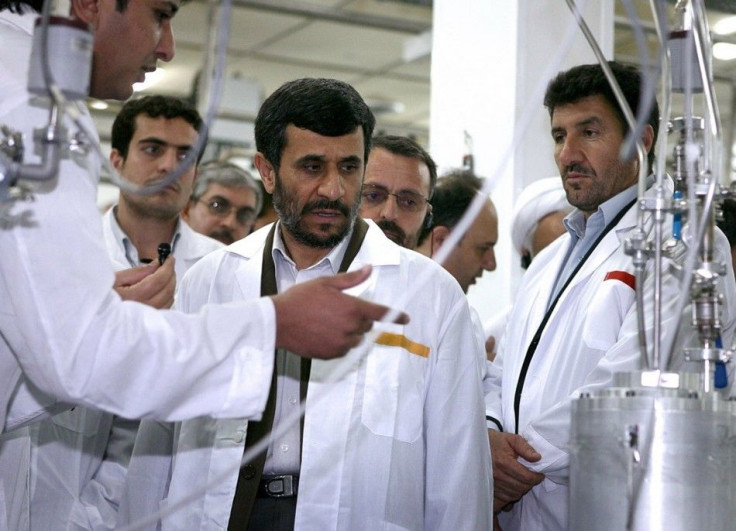Iran Worked on Nuclear Weapons: Report -- Is a Military Strike Coming Next?

Iran has conclusively worked on developing nuclear weapons, as well as tested weapons' parts, in the past and could still be doing it, the International Atomic Energy Agency (IAEA) said in a report.
From 2003 to 2010, Iran conducted some activities relevant to the development of a nuclear explosive device, that may still be ongoing.
The much anticipated and speculated upon-report from the United Nations' atomic watchdog also indicated that Iran has attempted to design relatively small warheads to fit on its ballistic missiles, which currently have the capabilities to strike Israel and American bases in the Middle East.
The document, drawing on eight years of collected evidence, shows that Iran worked to re-design and miniaturize a Pakistani nuclear-weapon design by using a web of front companies and foreign experts, Bloomberg reported on Tuesday.
Before the report, U.S. intelligence indicated that Iran had stopping pursuing nuclear weapons in 2003. The country is also developing nuclear power facilities and in September, it was reported that Iran increased its enriched uranium supply by 20 percent.
The IAEA report shows that Iran was also working on all aspects of weapons development.
The agency has serious concerns regarding [the] possible military dimensions to Iran's nuclear program, the report said, according to CNN.
After assessing carefully and critically the extensive information available to it, the agency finds the information to be, overall, credible. The information indicates that Iran has carried out activities relevant to the development of a nuclear explosive device.
The U.S. State Department has declined to comment on the report.
This was released to member states about an hour ago so we're going to take some time to look at it before commenting, State Department spokeswoman Victoria Nuland told a news briefing.
We are not prepared to talk about any next steps at this point.
The news is a serious threat to global security. Before the report was published, Israeli Prime Minister Benjamin Netanyahu and Defense Minister Ehud Barak stated that Israel should launch a pre-emptive strike against Iran to destroy its nuclear facilities.
Netanyahu's cabinet successfully convinced the prime minster to at least wait until the IAEA report was published. Now that it is clear that Iran intended, at least until recently, to be a nuclear power, Netanyahu and Barak will be chomping at the bit to stop Iran before a nuclear threat manifests itself.
Iranian President Mahmoud Ahmadinejad said any attack would be met with an immediate and vicious response.
In advance of the report, Ahmadinejad claimed that no matter what was found, Iran has not been working on atomic warheads, and that a conclusive report would be used as a Zionist excuse to attack the Muslim world.
Israel and the West, particularly the U.S., are afraid of the role and capabilities of Iran, and therefore are attempting to drum up international support for a military campaign against Iran, which is meant to deter Iran, Ahmadinejad said, according to the Tehran Times.
If American wants to confront the Iranian nation, it will certainly regret the Iranian nation's response, Ahmadinejad told the IRNA news agency.
They are saying that Iran is seeking the atomic bomb. But they should know ... we do not need a bomb ... Rather we will act thoughtfully and with logic. History has shown that anyone acting against the Iranian nation regrets it.
Iran's foreign minister Ali Akbar Salehi also stated that the IAEA wouldn't find any damning evidence of a nuclear weapons program.
There is no serious proof that Iran is going to create a nuclear warhead, Salehi was quoted as saying by Agence France Presse during a visit to Armenia.
The West and the United States are exerting pressure on Iran without serious arguments and proof. We have repeatedly stated that we are not going to create nuclear weapons.
He also seconded Ahmadinejad's insistence that the report could have been fabricated.
I believe that these documents lack authenticity. But if they insist, they should go ahead and publish. Better to face danger once than be always in danger, Salehi later told reporters at a conference in Moscow.
We have said repeatedly that their documents are baseless. For example one can counterfeit money, but it remains counterfeit. These documents are like that.
Regardless of the claims from both sides, the report will have geo-political implications and will be a the chief diplomatic topic in the Middle East.
There are a number of possible scenarios moving forward, from the benign to the extreme.
Some experts think that a nuclear Iran will create a tense Middle East arms race, with other states scrambling to develop both their own nuclear weapons and their own sophisticated ballistic missile defense systems, such as Israel's Iron Dome.
Eventually, Iran could increase the range and accuracy of its weapons, threatening Europe and even the United States. The situation could parallel the Cold War, or worse.
[The report is] the most damning report ever published by the IAEA and the conclusion arising from it is one: Iran is working to acquire a nuclear weapon, a diplomat in Vienna told Israeli daily Haaretz.
© Copyright IBTimes 2024. All rights reserved.





















